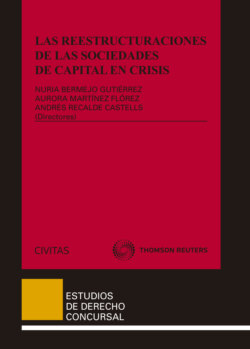Читать книгу Las reestructuraciones de las sociedades de capital en crisis - Aurora Martínez Flórez - Страница 64
На сайте Литреса книга снята с продажи.
IV. PROBLEMATIC ISSUES: ELIGIBILITY OF A PROPOSAL OF THE COMPANY INVOLVING EQUITY HOLDERS’ POSITION
ОглавлениеMany problems arise from the rules introduced by the decree-law 83/2015 concerning equity holders’ position in the agreement with creditors. The same problems seem to remain despite the approval of the new Italian crisis code.
First of all, paragraph 5 of art. 163 l.b.l. (as well as article. 90, paragraph 6, I. crisis c.) does not provide that the capital increase and the possible exclusion or limitation of shareholders pre-entive rights can be included in the proposal for an agreement with creditors filed by the distressed company. The law admits such a possibility only as a content of the proposal filed by one or more creditors (the so called competitive proposal [compared with debtor’s one]).
According to part of Italian law scholars the silence about it suggests that, in the case of proposal filed by the distressed company, the above-mentioned principle of neutrality of restructuring proceedings on the corporate structure still applies, so that the company plan would not cover an increase of share capital19).
Regarding this issue, however, it seems better a different opinion, deeming that also the debtor's proposal can have the content of art. 163, paragraph 5, I.b.l. The reason is the following: if creditors, who have not, pursuant to Italian company law, any decision-making power on the corporate structure and organization, can file a proposal providing an operation which affects the company structure and can change its ownership, it seems unreasonable not to attribute the same power also to the directors, acting in the name and on behalf of company. In other words, the a fortiori argument seems to point out that art. 163, paragraph 5, l.b.l. (or 90, paragraph 6, I. crisis c.) should not be interpreted as meaning that the competing proposal and only the competing proposal (i.e the proposal filed by one or more creditors) may provide the capital increase for distressed company.
The same conclusion could be grounded on the reasonableness of the law, as there are not plausible reasons to justify such a difference in treatment between the debtor’s proposal and the creditors’ one. Indeed, law scholars has rightly pointed out that the system resulting from the decree-law of 2015, through the introduction of the innovative rule about creditors competitive proposals, aims to build "a stimulus to the debtor rather than to be a real investment on the intervention of third parties in the crisis"20). It would, therefore, be quite irrational to prevent the debtor –which still has the monopoly for the commencement application of agree with creditors and whose proposal, however, is favoured by the law compared to any competitive proposals– the possibility of filing a proposal providing for an increase of share capital, where it is the best possible solution of the vicinity of insolvency21).
Moreover, if the possibility to influence the proprietary positions of shareholders with the restructuring plan is intended to enable the crisis solutions that help the rescue of the company and the best possible satisfaction of creditors, there is no reason why company proposal must not provide for such a possibility.
If, then, we look for some arguments more closely linked to the law, comparative analysis seems to be very important.
The strictly literal interpretation of article 163, paragraph 5, I.b.l. would lead to a dissonant solution compared to the ones of foreign legal systems, where the ablative measures against the participation of shareholders –whether or not contained in creditors’ proposed plan– can be linked to an act of impulse of the restructuring proceeding of the company as well as of a creditor22).
